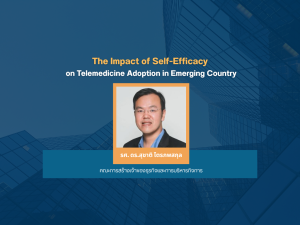
งานวิจัยเรื่อง The Impact of Self-Efficacy on Telemedicine Adoption in Emerging Country โดย รศ. ดร.สุชาติ ไตรภพสกุล คณะการสร้างเจ้าของธุรกิจและการบริหารกิจการ
Telemedicine has emerged as a vital innovation in healthcare, improving access to medical services by reducing the need for physical interactions. Previous studies revealed that self-efficacy influences individuals’ perceptions and behaviors toward adopting new technologies, especially telemedicine. However, these studies do not emphasize understanding how three sources of self-efficacy, namely, enactive mastery (EM), vicarious experience (VE), and verbal persuasion (VP), affect telemedicine adoption (TA) through perceptions of telemedicine technology. Based on the sample of 240 respondents, structural equation modeling (SEM) analysis was utilized to examine the proposed hypotheses. The results revealed that enactive mastery and vicarious experience positively influence perceived ease of use (PE), with vicarious experience also significantly impacting perceived usefulness (PU). Perceived ease of use significantly impacted perceived usefulness, strongly influencing telemedicine adoption. These findings confirm the impact of self-efficacy, especially enactive mastery, and vicarious experience components in sharping perceived ease of use and perceived usefulness. These are essential for driving telemedicine adoption and facilitating its adoption in an emerging country. The findings highlight the importance of these self-efficacy sources in telemedicine adoption strategies and suggest that enhancing individuals’ direct experiences and observational learning can foster telemedicine usage in emerging markets.
ข้อมูลในส่วนนี้สงวนสิทธิ์ไว้เฉพาะบุคลากรมหาวิทยาลัยกรุงเทพ
กรุณากรอก Username ของท่าน โดยไม่ต้องตามด้วย @bumail.net หรือ @bu.ac.th
Sign in with your BU email without @bumail.net or @bu.ac.th